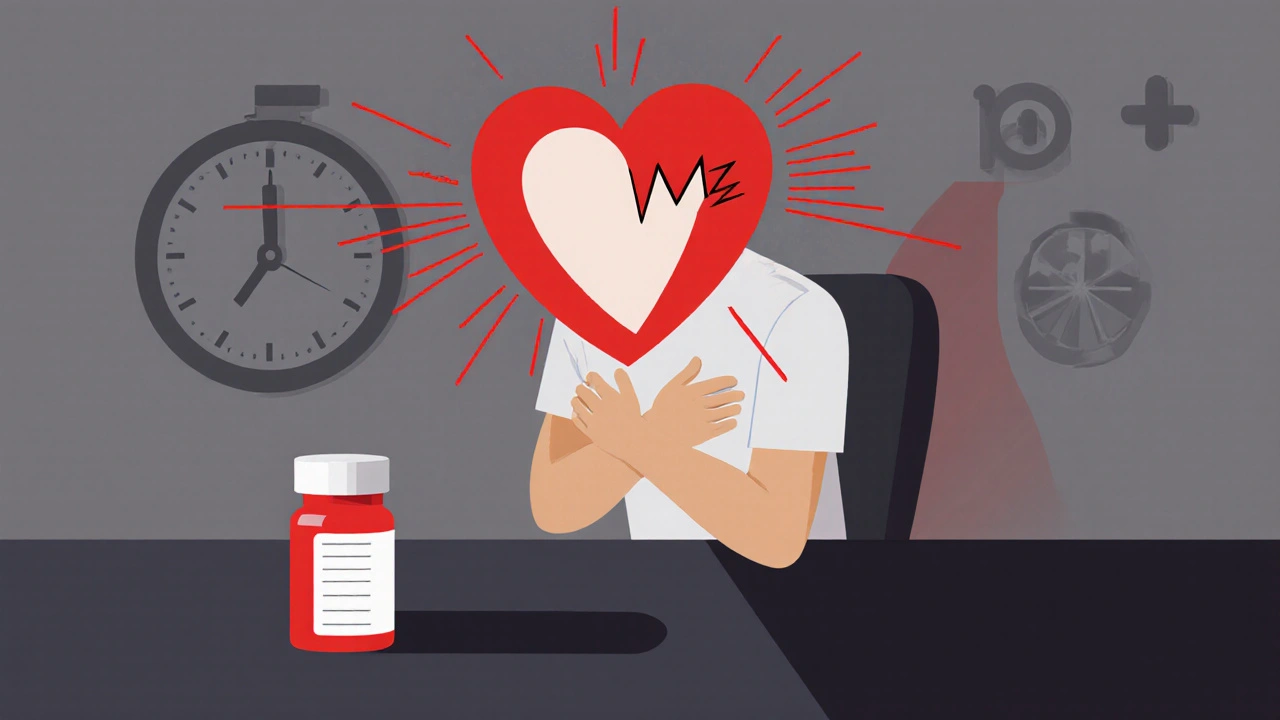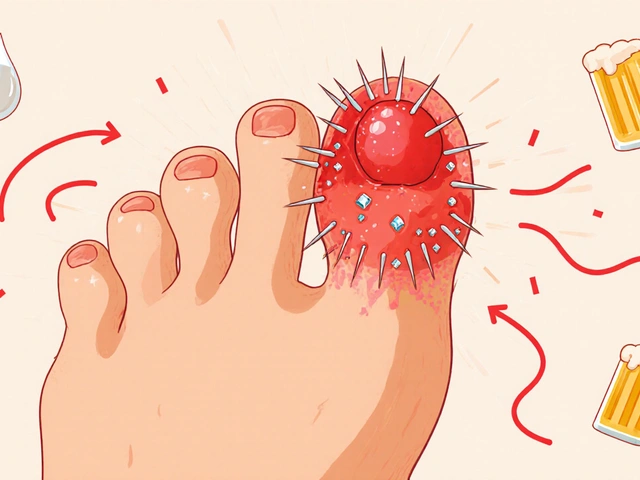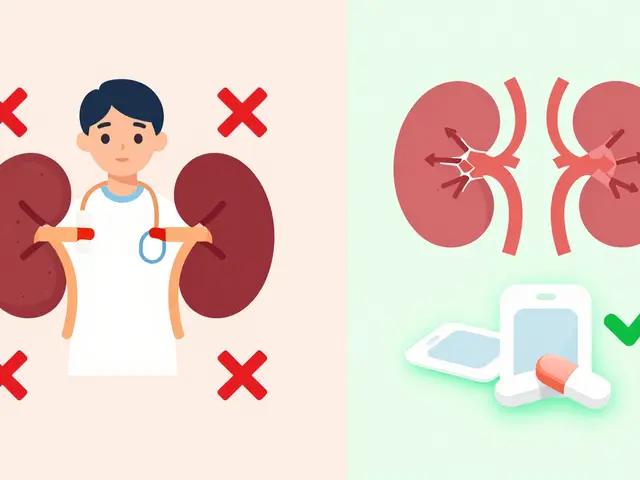Medication Side Effect Checker
Check if your symptoms could be dangerous medication side effects
Enter the symptoms you're experiencing. If you have any of the symptoms listed below, it could indicate a serious reaction that requires immediate medical attention.
Select any symptoms you're experiencing:
Medications save lives. But they can also hurt you-sometimes in ways you don’t notice until it’s too late. You take your pill like always, feel a little off, and brush it off as "just side effects." But what if that headache, rash, or fluttering heartbeat isn’t just a nuisance? What if it’s your body screaming for help?
The truth is, dangerous medication side effects don’t always come with a warning label you can read. Many start quietly. A slight swelling. A change in how you breathe. A sudden dizzy spell. These aren’t just "annoyances." They’re red flags. And if you miss them, the consequences can be fatal.
What Makes a Side Effect Dangerous?
Not all side effects are the same. Feeling sleepy after taking allergy medicine? That’s common. Upset stomach from antibiotics? Happens to a lot of people. But when a side effect threatens your life, it’s not just "unwanted"-it’s serious.
The FDA defines a serious side effect as one that causes death, hospitalization, disability, permanent damage, or birth defects. These aren’t rare. In 2022, over 1.3 million people in the U.S. ended up in the emergency room because of adverse drug reactions. About 128,000 died.
What’s worse? Many of these deaths happen because the early signs were ignored. A person thinks, "It’s probably just a stomach bug," when it’s actually internal bleeding from a blood thinner. Someone blames fatigue on stress, not realizing their liver is failing from a common painkiller.
Life-Threatening Symptoms You Can’t Afford to Ignore
Here’s what to watch for-exactly what your body might be telling you when something’s gone wrong.
- Difficulty breathing or tightness in your throat-This isn’t just a cold. If you feel like you can’t get air in, or your throat is swelling, this could be anaphylaxis. It can start within minutes of taking a pill. Hives, swelling of the lips or tongue, and wheezing often come with it.
- Chest pain or irregular heartbeat-If your heart races without reason (over 100 beats per minute), skips, or pounds like it’s trying to escape your chest, stop what you’re doing. This could mean your medication is triggering arrhythmia. Untreated, it can lead to cardiac arrest.
- Unusual bleeding or bruising-You didn’t bump into anything, but you’re covered in bruises? Or your gums bleed when you brush? Or you’re passing blood in your stool? This could signal your blood isn’t clotting properly. Medications like warfarin, aspirin, or even some antidepressants can cause this.
- Seizures or convulsions-Even if you’ve never had one before. A sudden seizure after starting a new drug is a medical emergency. It could mean your brain is reacting badly to the medication’s chemistry.
- Severe vomiting or blood in your stool-Persistent vomiting isn’t just unpleasant. When paired with dark, tarry stools or vomiting blood, it could mean internal bleeding or pancreatitis. Medications like semaglutide (Ozempic, Wegovy) and methotrexate have been linked to this.
- Yellowing of skin or eyes (jaundice)-This is a classic sign your liver is in trouble. If you also have dark urine, extreme fatigue, or pain under your right ribs, get to a hospital. Drug-induced liver damage can kill in days if not caught early.
- Swelling in your legs, face, or hands-Sudden, unexplained swelling isn’t just water retention. It could be a sign of kidney failure or a condition called DRESS syndrome, where your immune system goes haywire in response to a drug.
- Extreme drowsiness or confusion-If you’re nodding off during the day, can’t wake up fully, or feel disoriented after taking a new medication, this could be central nervous system depression. Opioids, benzodiazepines, and sleep aids are common culprits.
These symptoms don’t always show up right away. Some reactions hit within an hour. Others take days or weeks. But the one thing they all share? They get worse fast.
Fast vs. Slow: The Key Difference
Most common side effects-dry mouth, mild nausea, dizziness-come on slowly. They might start on day two or three. They’re annoying, but not dangerous.
Dangerous reactions? They accelerate. A rash that spreads in hours. A heartbeat that goes from normal to racing in 10 minutes. A headache that turns into a seizure in 30 minutes.
That speed matters. If you feel worse within 1-2 hours of taking a new pill, don’t wait. Don’t call your doctor tomorrow. Call 911 or go to the ER now. Delaying by even an hour can make the difference between recovery and death.

Who’s at Highest Risk?
Anyone can have a dangerous reaction. But some people are more vulnerable.
- People over 65-Your body processes drugs slower. You’re 2.7 times more likely to have a bad reaction than someone under 50.
- People taking five or more medications-Polypharmacy is the silent killer. The more pills you take, the higher the chance of a deadly interaction. One study found this increases risk by 300%.
- People with kidney or liver disease-These organs clear drugs from your body. If they’re not working well, the medication builds up to toxic levels.
- People with a history of allergies-If you’ve had a reaction to one drug, you’re more likely to react to another, especially if they’re chemically similar.
And here’s something no one tells you: look-alike drugs cause 12% of dangerous errors. Insulin and heparin look similar. Zyrtec and Zoloft sound alike. Always double-check the name on the bottle.
What to Do When You Notice Warning Signs
Don’t panic. But don’t wait.
If you have any of the life-threatening symptoms listed above:
- Call 911 or go to the nearest emergency room immediately. Don’t text your doctor. Don’t wait for an appointment. Time is critical.
- Bring all your medications. Use the "Brown Bag Method"-take every pill, supplement, and OTC drug you’re taking to the hospital. This helps doctors spot interactions.
- Don’t stop your meds on your own. Stopping suddenly can be deadly. Beta-blockers, antidepressants, and seizure meds can cause withdrawal that’s just as dangerous as the side effect.
- Report it. Tell your doctor. Then report it to the FDA’s Adverse Event Reporting System (FAERS). Your report could help save someone else’s life.
For less urgent but still serious signs-like unusual bruising, mild jaundice, or persistent nausea-call your doctor within 24 hours. Don’t wait until your next scheduled visit.
New Tools to Help You Stay Safe
Technology is catching up. Mayo Clinic’s new AI dashboard can now predict your personal risk of side effects with 89% accuracy by analyzing your age, weight, kidney function, and current meds. The FDA is rolling out real-time monitoring for high-risk drugs using hospital data. And in 2024, the NIH launched a $285 million program to test your genes before prescribing certain drugs-because your DNA can tell doctors if you’re likely to have a bad reaction.
Apple and the American Heart Association are even testing smartwatches that can detect irregular heartbeats caused by medications. In the near future, your pill bottle might beep if you’ve taken too much. Your phone might warn you before you even swallow a pill that could harm you.
But none of that replaces your own awareness.
What You Can Do Today
- Keep a written log of every medication you take-including vitamins and herbal supplements.
- Know the name, dose, and reason for each pill. Don’t rely on memory.
- Ask your pharmacist: "What are the top 3 warning signs I should watch for with this drug?"
- Check your skin, breathing, and energy levels daily after starting a new medication.
- If you’re over 65 or on five or more drugs, schedule a medication review with your doctor every six months.
Medications are powerful. They can fix broken bodies. But they can also break them-if you’re not paying attention. The best defense isn’t a new app or a fancy blood test. It’s knowing your body well enough to notice when something’s off.
Don’t wait for the worst to happen. Learn the signs. Trust your gut. And if something feels wrong-act fast. It could save your life.
Can medication side effects show up weeks after starting a drug?
Yes. While some reactions happen within minutes or hours, others take days, weeks, or even months to appear. Conditions like DRESS syndrome, drug-induced lupus, or liver damage can develop slowly. That’s why it’s important to keep monitoring your body even after you’ve been on a medication for a while. A new rash, unexplained fatigue, or swelling that shows up after three weeks could still be linked to a drug you started a month ago.
What should I do if I think a medication is causing side effects but I’m not sure?
Don’t guess. Don’t stop cold. Call your doctor or pharmacist and describe exactly what you’re feeling-when it started, how bad it is, and if anything makes it better or worse. Bring your pill bottles. They can help determine if it’s likely related to the medication or something else. Even if it turns out to be harmless, it’s better to check than to risk ignoring a serious reaction.
Are over-the-counter drugs safer than prescription ones?
No. Many people assume OTC meds are harmless, but that’s dangerous. Acetaminophen (Tylenol) is the leading cause of acute liver failure in the U.S. Ibuprofen can cause kidney damage or internal bleeding. Even common supplements like St. John’s Wort can interact with antidepressants and cause serotonin syndrome-a life-threatening condition. Every drug, no matter how simple it seems, carries risk.
Can I have a dangerous reaction to a drug I’ve taken before without problems?
Absolutely. Your body changes. Your liver and kidneys don’t work the same at 70 as they did at 30. You might start taking another medication that interacts with it. Or your immune system could suddenly react to something it tolerated before. Allergies and severe reactions can develop at any time-even after years of safe use.
How do I know if my symptoms are from the medication or just a coincidence?
Timing is the biggest clue. If a symptom started within hours or days of beginning a new drug, it’s likely related. Also, if the symptom improves after stopping the drug (under medical supervision) and returns when you restart it, that’s a strong sign. But don’t test this yourself. Always work with your doctor to figure it out safely.






David Cunningham November 23, 2025
Been on blood thinners for years and never thought about bruising being a red flag until now. Thanks for laying this out so clearly - I’ll start checking my arms every morning.
Shawn Daughhetee November 24, 2025
my grandma took 12 pills a day and never once asked what they did. she died from a drug interaction no one saw coming. this post saved my life.
ann smith November 25, 2025
Thank you for writing this. I used to brush off my dizziness as "just stress" until I ended up in the ER. Now I keep a symptom journal. Small changes save lives. 💙
Ravi Kumar Gupta November 25, 2025
In India, people buy antibiotics like candy from roadside shops. No prescription. No warning. My cousin died from liver failure after taking 3 different OTC painkillers for "fever." This isn’t just a Western problem - it’s a global emergency.
Rahul Kanakarajan November 27, 2025
Why do people still trust doctors who prescribe 7 meds for one problem? You think your body is a vending machine? Push button, get result. No. You’re a living system. Stop letting pharmacists be your brain.
New Yorkers November 27, 2025
It’s not the drugs that are dangerous. It’s the illusion of control. We think we can outsmart biology with pills. We’re just delaying the inevitable. The body always wins. This post? Just another footnote in the tragedy of modern medicine.
luke young November 28, 2025
I used to think "side effects" meant a little nausea or drowsiness. Now I know it’s the body’s alarm system. I always ask my pharmacist the top 3 warning signs now. Best habit I ever picked up.
manish chaturvedi November 29, 2025
As someone from India, I’ve seen too many elders take Western meds without understanding them. Language barriers, cost, and trust in big pharma make this worse. We need community health workers to explain this in local languages. Not just blogs.
Nikhil Chaurasia December 1, 2025
I used to think jaundice was just for alcoholics. Then my aunt got it from a common antibiotic. She didn’t even drink. I wish I’d known this sooner.
Holly Schumacher December 2, 2025
You say "don’t stop meds on your own" - but you also say "if you feel worse in an hour, go to the ER." So what if the ER says "it’s fine"? What then? You’re giving contradictory advice. Also, "brown bag method" is not a real medical term - it’s a meme. Please fact-check before posting.
Michael Fitzpatrick December 2, 2025
I’ve been on antidepressants for 11 years and never had an issue - until last month. I started getting this weird buzzing in my chest, like my heart was vibrating. I thought it was anxiety. Turns out it was QT prolongation from a new OTC cold med I’d been taking. Took me three weeks to connect the dots. This post? It’s like someone reached through the screen and slapped me awake. I’m printing this out and putting it on my fridge.
Miruna Alexandru December 4, 2025
The FDA’s Adverse Event Reporting System is a black hole. 99% of reports are ignored. Your "report it" advice is well-intentioned but functionally useless. You’re giving people false hope. The system is broken. You know it. I know it. Everyone here knows it. Stop pretending otherwise.
Justin Daniel December 5, 2025
lol at the "AI dashboard that predicts risk with 89% accuracy" - yeah right. My Fitbit told me I was stressed last week. I was just hungry. Tech thinks it’s helping. It’s just noise. But hey - at least we’re talking about it. That’s something.
Melvina Zelee December 7, 2025
my mom took tylenol for her back pain for 10 years. never knew it could wreck your liver. now she’s on a transplant list. i wish i’d known sooner. please tell your friends. this stuff matters.
steve o'connor December 8, 2025
My dad’s on 8 meds. He can’t even remember which is which. I started putting them in a pill organizer with color-coded labels. Now he doesn’t mix them up. Small thing. Big difference.